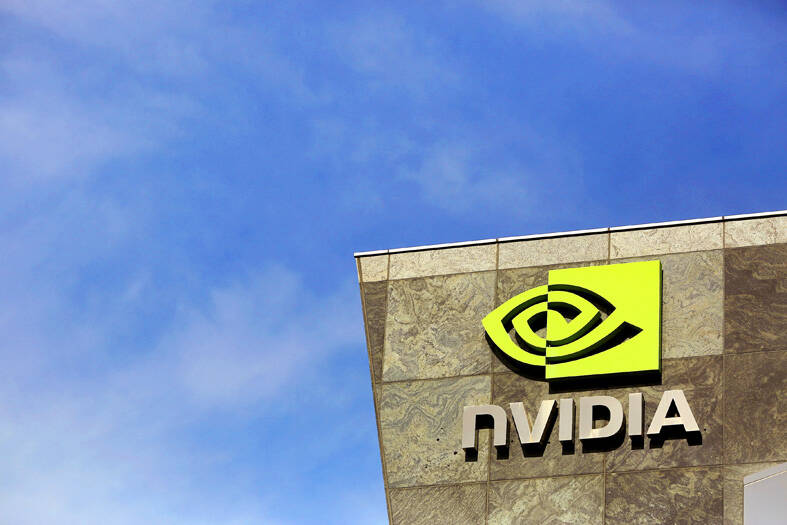Nvidia Corp, the most valuable chipmaker in the US, has begun producing a processor for China that conforms to new rules aimed at limiting that country’s access to artificial intelligence (AI) computing.
The A800 GPU, or graphics processing unit, went into production in the third quarter and serves as an alternative to the A100 model, Nvidia said in a statement on Monday.
“The A800 meets the US government’s clear test for reduced export control and cannot be programmed to exceed it,” the Santa Clara, California-based chipmaker said.

Photo: Reuters
Nvidia jarred investors earlier this year when it said that it was banned from selling the A100 and forthcoming H100 products to Chinese customers without special US government approval. The change put hundreds of millions of dollars in revenue at risk.
The US is concerned that the processors might be used by the military, Nvidia said in a regulatory filing in August.
The administration of US President Joe Biden expanded the restrictions last month, escalating tensions between the two countries and adding fresh hurdles for US chipmakers already facing a slump in demand.
Nvidia has lost more than half its value this year, following three straight years of gains.
Data centers rely on graphics chips like Nvidia’s to handle AI tasks and process huge sets of information. The US government’s rules on China exports place a cap on the speeds that such chips can communicate with each other, thereby limiting their usefulness.
Reuters previously reported that Nvidia had begun offering the A800.

Application-specific integrated circuit designer Faraday Technology Corp (智原) yesterday said that although revenue this quarter would decline 30 percent from last quarter, it retained its full-year forecast of revenue growth of 100 percent. The company attributed the quarterly drop to a slowdown in customers’ production of chips using Faraday’s advanced packaging technology. The company is still confident about its revenue growth this year, given its strong “design-win” — or the projects it won to help customers design their chips, Faraday president Steve Wang (王國雍) told an online earnings conference. “The design-win this year is better than we expected. We believe we will win

Intel Corp chief executive officer Lip-Bu Tan (陳立武) is expected to meet with Taiwanese suppliers next month in conjunction with the opening of the Computex Taipei trade show, supply chain sources said on Monday. The visit, the first for Tan to Taiwan since assuming his new post last month, would be aimed at enhancing Intel’s ties with suppliers in Taiwan as he attempts to help turn around the struggling US chipmaker, the sources said. Tan is to hold a banquet to celebrate Intel’s 40-year presence in Taiwan before Computex opens on May 20 and invite dozens of Taiwanese suppliers to exchange views

Chizuko Kimura has become the first female sushi chef in the world to win a Michelin star, fulfilling a promise she made to her dying husband to continue his legacy. The 54-year-old Japanese chef regained the Michelin star her late husband, Shunei Kimura, won three years ago for their Sushi Shunei restaurant in Paris. For Shunei Kimura, the star was a dream come true. However, the joy was short-lived. He died from cancer just three months later in June 2022. He was 65. The following year, the restaurant in the heart of Montmartre lost its star rating. Chizuko Kimura insisted that the new star is still down

While China’s leaders use their economic and political might to fight US President Donald Trump’s trade war “to the end,” its army of social media soldiers are embarking on a more humorous campaign online. Trump’s tariff blitz has seen Washington and Beijing impose eye-watering duties on imports from the other, fanning a standoff between the economic superpowers that has sparked global recession fears and sent markets into a tailspin. Trump says his policy is a response to years of being “ripped off” by other countries and aims to bring manufacturing to the US, forcing companies to employ US workers. However, China’s online warriors